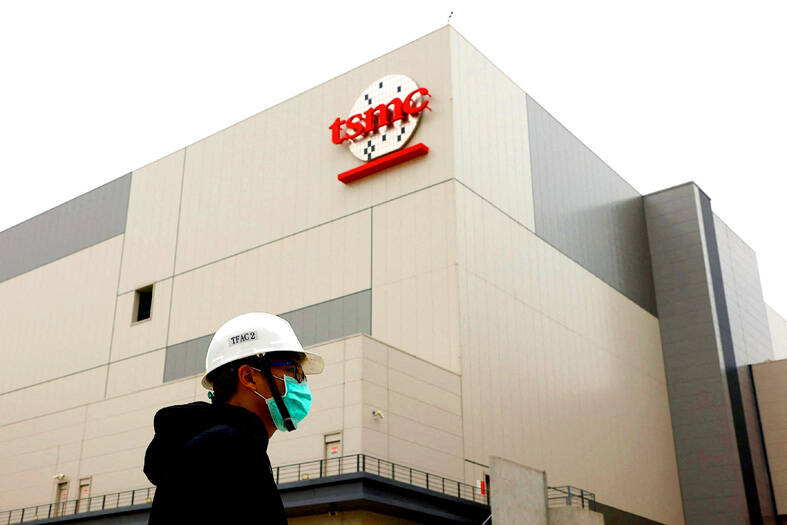Taiwan Semiconductor Manufacturing Co (TSMC, 台積電), the world’s largest contract chipmaker, last year remained the most profitable company in Taiwan, Taipei-based credit information company CRIF (中華徵信所) said.
Hon Hai Precision Industry Co (鴻海精密), a major iPhone assembler also known as Foxconn (富士康), generated the most in sales in the country last year, CRIF said in its latest top-5,000 company report.
Last year, the top 5,000 companies in Taiwan, comprised of entities in the public and private sectors, posted NT$3.58 trillion (US$110.2 billion) in combined net profit, down 17.72 percent from a year earlier, while their aggregate revenue totaled NT$40.55 trillion, down 6.05 percent year-on-year.

Photo: Ann Wang, Reuters
The decline in net profit and sales is largely related to high inflation and inventory adjustments in the global supply chains, CRIF said.
As Taiwan is a major supplier of the world’s high-tech gadgets, the country is prone to the impact from global economic weakness, it added.
A total of 2,082 Taiwanese companies saw their sales falling year-on-year last year, while 1,107 businesses enjoyed growth in sales and net profit, it said.
Out of the 1,107 companies, 664 generated more than NT$1 billion in sales each, accounting for 59.98 percent, it said.
Among the top 5,000 firms in Taiwan, TSMC, which boasts advanced chip production technologies, raked in NT$838.5 billion last year, keeping the title as the most profitable company in Taiwan, it said.
Hon Hai was second after registering NT$142.1 billion in net profit, ahead of smartphone IC designer MediaTek Inc (聯發科, NT$77 billion), Fubon Financial Holding Co (富邦金控, NT$65 billion) and United Microelectronics Corp (聯電, NT$61 billion), CRIF said.
Other profitable companies last year included CTBC Financial Holding Co (中信金控, NT$57.6 billion), Cathay Financial Holding Co (國泰金控, NT$51.5 billion), CTBC Bank (中國信託銀行, NT$41.3 billion), contract notebook computer maker Quanta Computer Inc (廣達, NT$39.7 billion) and telecom services provider Chunghwa Telecom Co (中華電信, NT$36.9 billion).
Cathay Financial rose from 11th spot in 2022 to No. 7 last year, Quanta Computer returned to the top 10 for the first time since 2013; and Chunghwa Telecom rose back to the top 10 list after being absent for two years, according to CRIF.
Hon Hai generated NT$3.45 billion in sales last year, the most among the 5,000 companies, with its ranking unchanged from a year earlier. It was followed by TSMC (NT$2.15 trillion); Pegatron Corp (和碩, NT$1.18 trillion) state-owned oil supplier CPC Corp, Taiwan (中油, NT$1.10 trillion), and Quanta Computer (NT$907.95 billion), CRIF said.

MULTIFACETED: A task force has analyzed possible scenarios and created responses to assist domestic industries in dealing with US tariffs, the economics minister said The Executive Yuan is tomorrow to announce countermeasures to US President Donald Trump’s planned reciprocal tariffs, although the details of the plan would not be made public until Monday next week, Minister of Economic Affairs J.W. Kuo (郭智輝) said yesterday. The Cabinet established an economic and trade task force in November last year to deal with US trade and tariff related issues, Kuo told reporters outside the legislature in Taipei. The task force has been analyzing and evaluating all kinds of scenarios to identify suitable responses and determine how best to assist domestic industries in managing the effects of Trump’s tariffs, he

TIGHT-LIPPED: UMC said it had no merger plans at the moment, after Nikkei Asia reported that the firm and GlobalFoundries were considering restarting merger talks United Microelectronics Corp (UMC, 聯電), the world’s No. 4 contract chipmaker, yesterday launched a new US$5 billion 12-inch chip factory in Singapore as part of its latest effort to diversify its manufacturing footprint amid growing geopolitical risks. The new factory, adjacent to UMC’s existing Singapore fab in the Pasir Res Wafer Fab Park, is scheduled to enter volume production next year, utilizing mature 22-nanometer and 28-nanometer process technologies, UMC said in a statement. The company plans to invest US$5 billion during the first phase of the new fab, which would have an installed capacity of 30,000 12-inch wafers per month, it said. The

Taiwan’s official purchasing managers’ index (PMI) last month rose 0.2 percentage points to 54.2, in a second consecutive month of expansion, thanks to front-loading demand intended to avoid potential US tariff hikes, the Chung-Hua Institution for Economic Research (CIER, 中華經濟研究院) said yesterday. While short-term demand appeared robust, uncertainties rose due to US President Donald Trump’s unpredictable trade policy, CIER president Lien Hsien-ming (連賢明) told a news conference in Taipei. Taiwan’s economy this year would be characterized by high-level fluctuations and the volatility would be wilder than most expect, Lien said Demand for electronics, particularly semiconductors, continues to benefit from US technology giants’ effort

‘SWASTICAR’: Tesla CEO Elon Musk’s close association with Donald Trump has prompted opponents to brand him a ‘Nazi’ and resulted in a dramatic drop in sales Demonstrators descended on Tesla Inc dealerships across the US, and in Europe and Canada on Saturday to protest company chief Elon Musk, who has amassed extraordinary power as a top adviser to US President Donald Trump. Waving signs with messages such as “Musk is stealing our money” and “Reclaim our country,” the protests largely took place peacefully following fiery episodes of vandalism on Tesla vehicles, dealerships and other facilities in recent weeks that US officials have denounced as terrorism. Hundreds rallied on Saturday outside the Tesla dealership in Manhattan. Some blasted Musk, the world’s richest man, while others demanded the shuttering of his